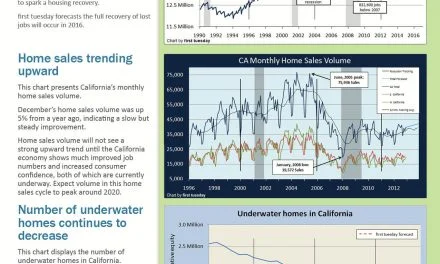This article reviews a newly-developed Fair Isaac Company (FICO) analytics model which predicts a borrower’s likelihood to exercise a strategic default and revisits the financial advantages of a strategic default for a negative equity homeowner.
FICO findings
Fair Isaac Company (FICO) researchers have developed new analytics to predict a borrower’s likelihood of walking away from a mortgage – a strategic default – whether or not he is delinquent on his payments. The rise in strategic defaults over the past year is of concern to mortgage lenders. Thus, FICO consulted with them (not underwater homeowners) to develop the analytics with the purpose of preventing strategic defaults and their costly impact on lenders, investors, homeowners and the housing market.
35% of mortgage defaults in September 2010 were strategic, an increase from the 26% more than a year earlier in March 2009 according to a University of Chicago Booth School of Business study. 22.5% of residential mortgage defaults nationwide were strategic in the third quarter of 2010. This number increased to 23.1% in the fourth quarter of the same year.
In negative-equity-laden California, strategic defaults are also widespread (more so than the nation as a whole since California is a nonrecourse state and lenders cannot viably threaten to sue for their losses). There were 45,380 strategic defaults in 2009 – 80 times the number in 2005. [For more information on the strategic default trend, see the August 2010 first tuesday article, Fannie Mae, our government and strategic defaults.]
FICO researchers found borrowers who walked away from their mortgages had common traits including:
- higher FICO scores;
- better credit management (understood financial statements);
- less retail balance (did not need credit to buy);
- shorter length of residence on the property and thus greater likelihood of a negative equity; and
- more open credit in the past six months with which to purchase items. [For more information on FICO’s findings on strategic defaulters, see the FICO article Predicting Strategic Default.]
The study concluded the degree of difference in the loan-to-value (LTV) ratio between the current market price for a home and the mortgage owed on the home (home price depreciation) is not as strong of an indicator for predicting a homeowner’s ability or willingness to strategically default. However, the study did conclude a borrower with a stronger history of good money management and a higher credit score tended to strategically default at a higher rate than other borrowers.
FICO and mortgage servicers are alarmed of the increasing frequency of strategic defaulters and warn homeowners of the consequences of walking away from their mortgage payments. Not only will homeowners suffer a 150+ point hit to their credit scores, but they may also face higher rates, tighter terms for other types of credit and a bump in insurance premiums. FICO goes on to implicitly threaten the homeowner who reverts to renting after walking away by saying landlords will be more unwilling to accept them as a tenant when they see a strategic default on the tenant’s credit record. [For more information about the fallacy of FICO’s argument, see the June 2010 first tuesday article, The FICO score delusion.]
This is a fabrication of the worst type. FICO and the lenders they consulted with (who incidentally are the ones who pay FICO for the use of their algorithms) have an economic interest in keeping California’s population of negative equity homeowners imprisoned in their underwater homes. The truth is, any landlord fully understands that a strategic defaulter is going to make a very fine, long-term tenant if they have a job and otherwise pay their bills – and most all do since they made the sound decision to strategically default.
Walking away is for smart people, and lenders know it
Several studies over the past years have already observed strategic defaulters tend to hail from a more financially savvy crop of people. The recent FICO study repeats this conclusion of which many of us are familiar.
What it also advertises — to the endorsement of lenders — are the detrimental effects of walking away from a mortgage. Agents and brokers must construct the bigger picture, especially in California where underwater homeowners collectively hold over 2,000,000 negative equity mortgages. [For more information on the relationship between higher credit scores and strategic defaults, see the October 2009 first tuesday article, Financially savvy homeowners turn to mortgage defaulting as a strategy.]
California negative equity homeowners have the short end of the stick with black-hole assets on their hands, so the question they should be answering is not whether a strategic default would be a in the best interest of their lenders. Rather, they should be considering whether a strategic default would be a prudent choice for their personal financial situation.
It’s true, homeowners will see a hit to their credit scores from a strategic default — and of course FICO will highlight this since the media often overstates this figure — but homeowners must not be inveigled into staying in negative equity properties by the vague economic threat of a lower FICO score. It’s not about the FICO score alone, but the costs versus benefits analysis of the homeowner’s individual situation.
Either a homeowner can continue to siphon his money into a dead-end loan, or he can save that money and invest it into a much more lively investment — improving his family’s standard of living.
A strategic default when the LTV is above 125% is not a dishonest financial bailout – it is prudent business decision. It may temporarily hurt the pride and credit scores of California homeowners, but these things are soon remedied. [For more information on when to strategically default, see the May 2011 first tuesday article, Short sale or foreclosure? The naked truth for underwater homeowners.]
Paying lenders the full amount on an underwater home is not what is going to fuel the recovery of a family or the California economy — what we need is to put cash in the hands of negative equity Californians. If they aren’t going to get any cramdowns in bankruptcy courts, they need to exercise their legal right to strategically default — that “put option” in every trust deed. Besides, it’s what all the smart people are doing anyway, right?















My wife and I purchased a condo 5 years ago and we love the place. We have a credit score of 800+ however we have seen a rapid rise in delinquent HOA dues and foreclosures which has led to increases in homeowner dues to cover for the missing revenue. Our reserves are not where they need to be and we just found out the reserve study conducted several years ago was grossly misleading. In fact, we are looking to have a special assessment since our reserves will not cover the expenditures needed (delinquent dues over 30%). FHA will not loan money and renters are becoming more of a problem. My wife and I have done everything right but we find it harder to justify remaining in a situation where we are at the mercy of others doing their part.
Out of 10 units in our building alone there are only 3 original buyers. The rest have foreclosed or are renting the units out. Not to say that strategic foreclosures are the right thing to do, but there comes a tipping point where the confidence in the market and neighbors make this look like the only option left.
Everyone is missing the real point here.. lenders do not own your property. Loan mods are a scam.. since investors ever loaned money on your home.. they have never been contacted in regards to approving loan mods or foreclosure.. banks set this whole thing up to make record profits.. they took out default insurance knowing full well most loans would default.. they sold homes to everyone driving prices far beyond what is reasonable.. they crashed our economy and the economy around the world.. anyone who feels banks can take a homeowner to court for strategic default is ill informed. They can only push a homeowner around that is not informed of their true rights and the fact the pretend lender/ servicer has no rights or true interest in your property. All servicers are legally supposed to offer you a sit down meeting with all your investors of your property to discuss changing terms (loan mods) vs foreclosure.. lenders destroyed documents and paper trails so investors can be connected to any one property making it impossible to find the investors… now homeowners rights have been violated.. per civil code 2923.5.. if you request this action from your pretend lender/servicer.. they will not respond.. now you have cause of action in bk or state court. banks don’t own your house.. you can walk away or short sale.. either way they won. If you stay and don’t pay.. sue them.. now you stand a fighting chance. once you walk, they sell the house.. collect default insurance serveral times in many cases.. as they duplicate case #s to defraud insurance companies.. its a horrible mess of epic proportions. The only criminals are the banks and wallstreet.. no homeowner should be held accountable for the fraud that was committed on each and every loan. Homeowners have rights and can and are challenging big banks. must see documentary.. Inside Job.
In California non purchase money loans can be foreclosed upon judicially, meaning that a deficiency judgment is technically possible. This also means that a strategic defaulter could have his or her other assets attached. Also, in the case of second mortgages, when the 1st forecloses the 2nd becomes unsecured. The debt is not erased, it just changes forms. In CA once a Trust deed sale has occurred the creditor cannot come after the borrowers other assets, regardless of whether or not it was purchase money or not.
I keep hearing allusion to the Evil Lenders. I think it should be more the STUPID lenders. Who has been hurt the most by falling homes prices? The lenders who made those zero down EZ doc mortgages, or at least the people who bought the paper. The problem for the rest of it is that it was done on a such a large scales that it affected the entire market. The sheer abundance of bad mortgages made many otherwise good mortgages go bad. Since those of us on the front lines that have a clue knew these were insane products, why did we not speak up? Because we were making too much money selling the product. So now what we get is a complete retraction of the market and elimination of the very products-and buyers-that could save the housing market. I can’t think of anything better for the economy than some sensible sub prime and/or EZ doc lending. If you have marginal credit, bring in a good down payment. If you can’t properly document your income but have great credit and assets, same thing. 25% down EZ doc with a 740 FICO. That’s a good loan. Frank-Dodd pretty much precludes these products from coming back, but they would be a wonderful shot in the arm for the housing industry and the economy as a whole.
Hmmm… Breach of contract…. So? That’s not a bad word.
In contracts the closest thing to morality is that one negotiates in good faith before the contact is signed. After that the terms of the Agreement take over and morality is precluded by them. In real estate the conventions are very clear and supported by contract and law.
As a RE broker over the years people have backed out of Agreements that were too small/expensive to litigate; they walk. Examples of that occur frequently to landlords where damages exceed security and tenants have left the local jurisdiction.
The terms of the trust deeds are clear, in the current environment the owners have the advantage (IMO). I know more than a few are in the homes for over a year without making payments and the banks are reluctant to foreclose. That included multi family and retail properties (where rents are collected.
The FICO scores will evolve with the current environments. So many people will have poor scores, the lenders will lend to the low hanging fruit, because they have to lend. The people with higher scores will be paying a little higher rate for the banks to cover the default rate of the low scorers; as it happens now with credit card debt.
I think the author of the article has a valid point, strategic default is a good idea when evaluated on a case by case basis.
Whoa, Jake. It’s not an undertone in my response in thinking that strategic defaulters are being irresponsible or malicious, I’m saying it straight out ! You are trying to get out from under a contractual obligation, period. The term “strategic default” is a euphemism for “deadbeat”. To call it anything else is deceptive and misleading.
You shot your own argument down early in the second paragraph. By stating that you “merely want to reduce the interest on” your “mortgage to the current prevailing rate”, what you’re really saying is “damn the original contract I entered into, I want something different now”. What a ridiculous sense of entitlement you have, Jake. Are you going to take your new car back to the dealership when you see another one advertised for less a week later? How about asking for a refund at a gas station when after fueling up you see another station two blocks away at a lower price? The grocery store? Dry cleaners? Where does it end with that kind of thinking?
Even if you’ve been treated with contempt as you claim, what on earth makes you think that that somehow confers on you the right to “punish” the mortgage holder by reneging on your original contractual obligation? The bank has no obligation to give you a loan modification, just like they had no obligation to give you a loan in the first place, none whatsoever. No one forced you into the original loan terms, presumably you gave all aspects of the transaction reasoned analysis before entering into the agreement.
Or did you? Maybe, just maybe, like so many others in over their mortgage head, made a decision at the time you thought made sense but turned out it didn’t when the dice were actually rolled and the economy turned south?
I acknowledge now as I did in my original post, there is no moral obligation under the law to pay any loan – but don’t think for a minute that you can give it any other name than “breach of contract”.
Vince, there’s an undertone in your response of you thinking strategic defaulters are being irresponsible or malicious. I don’t think that’s true in most cases. I think many strategic defaulters are exercising a last ditch option in a system that is treating them like enemies.
I’ll give you an example. I have an average credit score over 800. I have a high income and no other debt besides my mortgage. Nevertheless, banks refuse to give me a loan modification. I merely want to reduce the interest on my mortgage to the current prevailing rate. Nope, is the answer, but it’s not only that. The bank loan officers treat me with contempt, like I’m a joke or something. I get this treatment after 10+ years of faithfully paying my mortgage on time. Also, I would have to be in financial trouble to do a short sale.
Accordingly, the concept of a credit score is a scam that’s being thumbed in my face everyday. I played by the rules. I did my part to get my credit score to be really high. Not only does it NOT matter, having a high credit score is actually a hindrance (because I can’t do a short sale). It’s people like me who are floating the economy. Meanwhile, I’m treated like the enemy.
For these reasons, I have no moral issue with a homeowner performing a strategic default.
A couple things can possibly end up happening on this – new laws will be pursued on a Federal level that effectively make this type of action by a borrower/debtor a white collar crime on the order of fraud, it will go beyond whether or not it was the borrower’s original intent at the time of entering into the contract, but whether or not the intent at any time was to default with intent to enrich themselves.
The second possibility will be formal changes in the notes/contracts themselves to provide that this type of “self-medicating” of one’s own financial position to the detriment of the lender’s position with intent to defraud is an actionable civil liability. All States that don’t already have the need have the laws changed to provide for debtor liability for deficiency balances.
The effect of these would be to force otherwise able to pay debtors to not just take a hit on their credit scores but to file for bankruptcy. This could make them think just a little harder about the ramifications of just walking away from a debt.
While I understand there is no moral obligation under the law to pay any loan, if your LTV is now over 100%, why can’t you just stay in the home for 10, 15 or 20 years while your equity rebuilds and your principal balance decreases as you pay? It was only in the late 70s and early 80s that people starting looking at a home as not only a place for their family to live but as a source of income in periodic refinances and cash-out borrowing. Before that people bought a home and stayed in it and eventually made payment number 360. Sure, from time to time they took out small seconds for college tuition, or to add a room, swimming pool, walk in closet or laundry room but that’t when people acted more responsibly with others money.